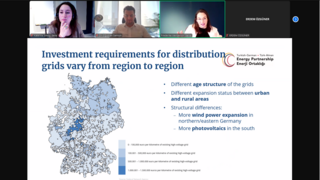Release Event for the Modelling Study on Distributed Generation and Electric Vehicles in Turkish Grids

On 18th December, 2024, experts and stakeholders from Türkiye and Germany gathered online for the release of the modelling study “Integration of Decentralised Generation and Electric Vehicles into Turkish Distribution Grids by 2038”. The study was developed within the framework of the Renewable Energies, Energy Infrastructures & Sector Coupling working group of the Turkish-German Energy Partnership (TGEP), which is co-chaired by the German Energy Agency (dena) and the Ministry of Energy and Natural Resources (MENR). A very important project partner during the project was Enerjisa Enerji and the modelling study was prepared by Aplus Enerji, YTU TTO and dena.
Key Insights from the Study
During the event, Prof. Dr. Ozan Erdinç (YTU) and Volkan Yiğit (Aplus Enerji) presented the study’s main findings, which focus on the impacts of distributed generation (DG) and electric vehicles (EVs) on part of the Turkish distribution grids. Using real-world data and future scenarios for 2023, 2030, and 2038, the study highlighted the effects of of EV and DG integration on power losses, voltage profiles, and load factors in medium voltage grids. Key results demonstrated that EV and DG integration can maintain voltage stability and reduce power losses until 2030, while strategic grid investments will be required beyond that point in time to prevent transformer overloading and ensure reliability.Policy recommendations outlined the importance of proactive grid planning and investments, regulatory flexibility to accommodate EV growth, and the development of smart grid infrastructure.
The second section of the study, prepared by dena and presented by Friederike Wenderoth, emphasised the value of introducing regulatory amendments such as the adjustment of power consumption of controllable loads during grid congestion and when grid safety or reliability is threatened as well the importance of predictive grid planning on distribution level. Additionally, the lessons learned from the German smart meter rollout were highlighted.
The event ended with a panel discussion featuring Dr. Kathrin Goldammer (Reiner Lemoine Institut), Dr. Oğuzcan Samsun (Enerjisa Enerji), Hasan Aksoy (SHURA Energy Transition Center) and Friederike Wenderoth.Opened by Dr. Philipp Ulbrich (CFO, Enerjisa Enerji), the panel explored practical solutions for improving data quality and exchange on the distribution level. Topics included challenges in integrating EVs, the importance of open-source approaches, and balancing data confidentiality. Panellists shared insights from ongoing projects and studies, including SHURA’s work on EV integration in Türkiye and dena’s Distribution Grid Study II in Germany.
The full study can be accessed here.